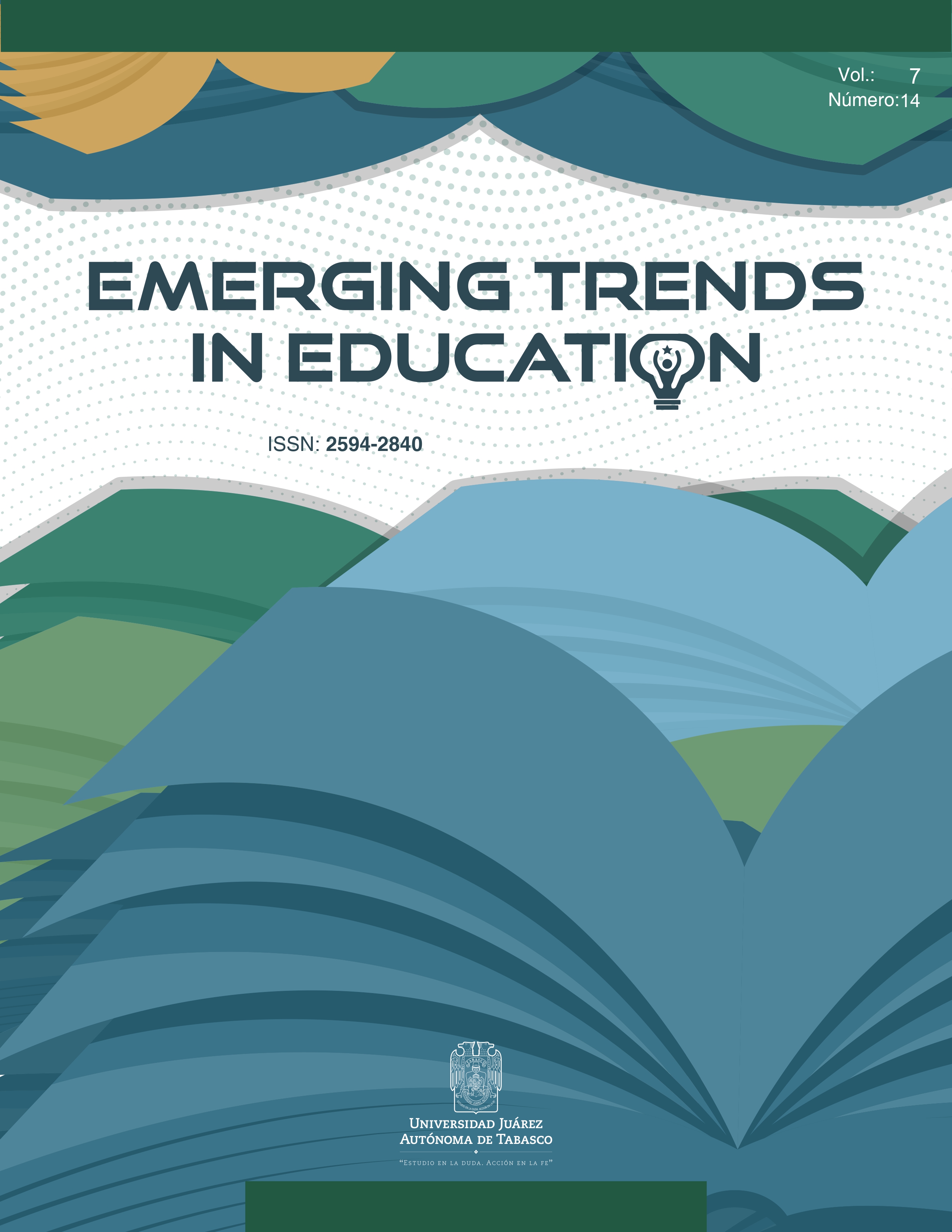Middle Leaders: New essential figures in the management of educational organizations
DOI:
https://doi.org/10.19136/etie.v7n14.6313Keywords:
Leadership, Middle leadership, Educational Organizations, Educational ManagementAbstract
Educational organizations have constantly evolved throughout history, especially since the late 20th century. The new leadership models, centered on democratization, power distribution, and participation, have led to the creation of new roles for education professionals. Intermediate leadership is a role that many professionals currently develop, establishing a relationship both with senior management and with the rest of the educational community.
The objective of this research is to provide an approximation and theoretical analysis of the figure of intermediate leadership. Through the contributions of various studies focused on this leadership model, the new management and leadership distribution needs of educational organizations are related. Subsequently, the three dimensions that shape the leadership profile of intermediate leaders are analyzed: pedagogical, organizational, and relational, as well as the key contribution that this new leadership model can provide to educational management.
The results allow for an understanding of the importance of these figures for the positive management of educational organizations, especially in light of the need for senior management to distribute leadership.
References
Adams, D., Sothinathan, J. S., & Radzi, N. M. (2024). Science mapping the evolution of middle leadership research, 2002–2023. Educational Management Administration & Leadership. Advance online publication. https://doi.org/10.1177/17411432241257893
Amey, M. J., & Eddy, P. L. (2018). Leading in the middle. En J. S. Levin & S. T. Kater (Eds.), Understanding Community Colleges (2ª ed., pp. 203–226). Routledge.
Balda Macías, R. D., & Guzmán Ramírez, A. (2015). Liderazgo educativo transformacional como necesidad de las instituciones educativas en la república de ecuador. REFCalE: Revista Electrónica Formación Y Calidad Educativa. ISSN 1390-9010, 3(2), 109–120. https://refcale.uleam.edu.ec/index.php/refcale/article/view/370.
Barrero, B., Domingo Segovia, J., & Fernández Gálvez, J. D. (2020). Liderazgo intermedio y desarrollo de comunidades de práctica profesional: Lecciones emergentes de un estudio de caso. Psicoperspectivas, 19(1), 1-13 https://dx.doi.org/10.5027/psicoperspectivas-Vol19-Issue1-fulltext-1751
Bassett, M. (2016). The role of middle leaders in New Zealand secondary schools: Expectations and challenges. Waikato Journal of Education, 21(1). https://doi.org/10.15663/wje.v21i1.194
Berman, S., & Korsten, P. (2014). Leading in the connected era. Strategy and Leadership, 42(1). https://doi.org/10.1108/SL-10-2013-0078
Bolívar, A. (2015). Un liderazgo pedagógico en una comunidad que aprende. Padres y Maestros, (361), 23-27. https://doi.org/10.14422/pym.i361.y2015.004
Bolívar, A. (2019). Una dirección escolar con capacidad de liderazgo pedagógico. Madrid: La Muralla
Brown, M., Rutherford, D., & Boyle, B. (2000). School effectiveness and school improvement. International Journal of Research, Policy and Practice, 11(2).
Cantón, I. (2021). Reseña: El liderazgo humilde de los mandos intermedios. Los que consiguen que las cosas se hagan, cambien y sucedan. Education Siglo XXI, 39(1), 377-380. https://revistas.um.es/educatio/article/view/469341
Chapman, C., Muijs, D., Reynolds, D., Sammons, P., & Teddlie, C. (2016). The Routledge international handbook of educational effectiveness and improvement: Research, policy, and practice. London: Routledge
Coronado, M. R., Jiménez, A., & Jaramillo, A. (2022). El liderazgo una cualidad del docente 4.0 en las instituciones de educación superior en Colombia. Visión Educativa, 4(2). https://revistasuba.com/index.php/VISIONEDUCATIVA/article/view/189/124
Cortez, M., & Zoro, B. (2016). El rol estratégico de los liderazgos medios al interior de las escuelas para la mejora escolar: Una mirada desde la literatura internacional. Líderes Educativos, 8 https://www.lidereseducativos.cl/wp-content/uploads/2017/01/NT-8.pdf
Daly, A., & Finnigan, K. (2016). Thinking and acting systemically: Improving school districts under pressure. American Educational Research Association
Dastmalchian, A., Rezac, D., Muzyka, D. F., Bayraktar, S., Steinke, C., & Imer, H. P. (2016). Developing a measure for “connectorship” as a component of engaged leadership. Leadership & Organization Development Journal, 37(3).
Day, C., & Sammons, P. (2013). Successful leadership: A review of the international literature. England: CfBT Education Trust
Forero, C. E. (2012). Perspectivas teóricas de aproximación a la organización y estructura de la institución educativa. Colombia: Universidad de La Sabana. https://intellectum.unisabana.edu.co/handle/10818/6583
Fullan, M. (2015). The new meaning of educational change. New York: Teachers College Press
Fullan, M., & Quinn, J. (2016). Coherence making. School Administrator, 73(6).
Gaete, M., Acuña, V., & Ramírez, M. (2020). Liderazgo social, motor de las prácticas en educación en contextos de encierro. Psicoperspectivas, 19(1). https://dx.doi.org/10.5027/psicoperspectivas-Vol19-Issue1-fulltext-1767
González-Fernández, R., López Gómez, E., Khampirat, B., & Gento Palacios, S. (2021). Medición de la importancia del liderazgo pedagógico de acuerdo con la percepción de los evaluadores. Revista de educación, 394. Recuperado a partir de https://recyt.fecyt.es/index.php/Redu/article/view/90193
González, T. (2014). El liderazgo para la justicia social en organizaciones educativas. Revista Internacional de Educación para la Justicia Social (RIEJS), 3(2). https://repositorio.uam.es/handle/10486/666737
Grootenboer, P. (2018). The practices of school middle leadership: Leading professional learning. EUA: Springer
Grootenboer, P., Edwards-Groves, C., & Rönnerman, K. (2015). Leading practice development: Voices from the middle. Professional Development in Education, 41(3). https://doi.org/10.1080/19415257.2014.924985
Hargreaves, A., & Fullan, M. (2012). Reviving teaching with ‘professional capital’. Educational Week, 31(33).
Hargreaves, A., & Fullan, M. (2014). Capital profesional. Transformar la enseñanza en cada escuela. Madrid: Morata
Harris, A., & Busher, H. (2000). Subject leadership and school improvement. London: Sage Publications Ltd
Harris, A., & Jones, M. (2012). Connecting professional learning: Leading effective collaborative enquiry across teaching alliances. UK: National College for School Leadership.
Harris, A., & Jones, M. (2017). Middle leaders matter: Reflections, recognition and renaissance. School Leadership & Management, 37(3), 213-216.
Hernández, L., & Gómez, M. (2023). Emotional and social competencies in middle leadership: Enhancing inclusivity in schools. Journal of Inclusive Education, 28(3), 215-230.
Highfield, C. (2012). The impact of middle leadership practices on student academic outcomes in New Zealand secondary schools. [Tesis de Educación, University of Auckland]. http://hdl.handle.net/2292/19796
Highfield, C., Webber, M., & Woods, R. (2024). Culturally responsive middle leadership for equitable student outcomes. Education Sciences, 14(3), 327. https://doi.org/10.3390/educsci14030327
Lee, S., & Kim, H. (2024). Adapting to change: The flexible roles of middle leaders in education. Educational Review, 76(1), 15-30.
Leithwood, K. (2009). ¿Cómo liderar nuestras escuelas? Aportes desde la investigación. Xile: Fundación Chile, Área de Educación. https://santic.cl/mt-content/uploads/2023/05/leithwood_como-liderar-nuestras-escuelas.pdf
Leithwood, K. (2016). Department-head leadership for school improvement. Leadership and Policy in Schools, 15(2).
Leithwood, K., Day, C., Sammons, P., Harris, A., & Hopkins, D. (2006). Successful school leadership: What it is and how it influences pupil learning. Nottingham: N. C. for S. Leadership & D. for E. and Skills.
Lipscombe, K., Tindall-Ford, S., & Lamanna, J. (2023). School middle leadership: A systematic review. Educational Management Administration & Leadership, 51(2), 270-288. https://doi.org/10.1177/1741143220983328
Maddock, L. C. (2023). Academic middle leaders, middle leading and middle leadership of university learning and teaching: A systematic review of the higher education literature. Journal of Higher Education Policy and Management, 45(4), 357–392. https://doi.org/10.1080/1360080X.2022.2160888
Maureira, O., Moforte, C., & González, G. (2014). Más liderazgo distribuido y menos liderazgo directivo: Nuevas perspectivas para caracterizar procesos de influencia en los centros escolares. Perfiles Educativos, 36(146), 134–153. https://doi.org/10.1016/S0185-2698(14)70132-1
Ministerio de Educación de Chile, Mineduc. (2016). Resultados de la evaluación docente 2015. Santiago de Chile: CPEIP
Ministerio de Educación de Chile, Mineduc. (2014). Estándares indicativos de desempeño para los establecimientos educacionales y sus sostenedores. Santiago de Chile: CPEIP
Olondriz Valverde, A., Del Arco, I., & Mercadé-Melé, P. (2024). El Liderazgo Intermedio en la Investigación Educativa: Un Estudio Bibliométrico. International Journal of Educational Leadership and Management, 12(3), 193–224. https://doi.org/10.4471/ijelm.14765
Organisation for Economic Co-operation and Development. (2008). Improving school leadership. Volume 1: Policy and practice. OECD Publishing
Organisation for Economic Co-operation and Development. (2009). Creating effective teaching and learning environments: First results from TALIS. OECD Publishing
Organisation for Economic Co-operation and Development. (2014). Teaching and learning international survey TALIS 2013. Conceptual framework. OECD Publishing
Pedraja, L. M., Marchioni-Choque, I. A., Espinoza-Marchant, C. J., & Muñoz-Fritis, C. P. (2020). Liderazgo y cultura organizacional como factores de influencia en la calidad universitaria: Un análisis conceptual. Formación universitaria, 13(5). http://dx.doi.org/10.4067/S0718-50062020000500003
Pinto, V., Galdames, S., & Rodríguez, S. (2010). Knowledge development and challenges for the formation of intermediate leaders of educational organizations. Psicoperspectivas, 9(2) https://dx.doi.org/10.5027/psicoperspectivas-Vol9-Issue2-fulltext-123
Rincón, S. (2018). Las redes escolares como entornos de aprendizaje para los líderes escolares. En J. Weinstein & G. Muñoz (Eds.), Cómo cultivar el liderazgo educativo. Trece miradas (p. 355-388). Chile: Ediciones Universidad Diego Portales. https://liderazgoeducativo.udp.cl/cms/wp-content/uploads/2020/04/Libro13miradas.pdf
Robinson, V. M. J., Lloyd, C. A., & Rowe, K. J. (2008). The impact of leadership on student outcomes: An analysis of the differential effects of leadership types. Educational Administration Quarterly, 44(5), 635-674 https://doi.org/10.1177/0013161X08321509
Rodríguez, E. (2010). Estilos de liderazgo, cultura organizativa y eficacia: Un estudio empírico en pequeñas y medianas empresas. Revista de Ciencias Sociales, 16(4), 629-64.. https://www.redalyc.org/pdf/280/28016613006.pdf
Rodríguez, G., & Gairín, J. (2017). Influence of the practices of pedagogical leadership in the educational pedagogical practices: Case in Chile of the pedagogical technical units. International Journal of Educational Leadership and Management, 5(1), 6-29. https://ddd.uab.cat/record/234917
Ryan, J. (2017). Un liderazgo inclusivo para las escuelas. En J. Weinstein (Ed.), Liderazgo educativo en la escuela: Nueve miradas. Chile: Ediciones Universidad Diego Portales Un liderazgo inclusivo para las escuelas. En J. Weinstein (Ed.), Liderazgo educativo en la escuela: Nueve miradas. Chile: Ediciones Universidad Diego Portales. https://liderazgoeducativo.udp.cl/cms/wp-content/uploads/2020/04/Liderazgo-Educativo-en-la-Escuela.-Nueve-miradas.pdf
Sans-Martin, A., Guardia, J., & Triado-Ivern, X. M. (2016). El liderazgo educativo en Europa: Una aproximación transcultural. Revista de Educación, 371, 83-106.
Sepúlveda, R., & Volante, P. (2018). Liderazgo instruccional intermedio: Enfoques internacionales para el desarrollo profesional docente en las escuelas chilenas. Revista Profesorado, 82. https://doi.org/10.30827/profesorado.v23i3.11231
Sepúlveda Sanhueza, R. (2020). Efecto de prácticas de liderazgo intermedio y alineamiento de prácticas pedagógicas en el logro académico en las asignaturas de lenguaje y matemáticas en escuelas secundarias chilenas. Santiago de Chile: Pontificia Universidad Católica de Chile
Sierra, G. M. (2016). Liderazgo educativo en el siglo XXI, desde la perspectiva del emprendimiento sostenible. Revista EAN, (81), 111-129. https://doi.org/ http://dx.doi.org/10.21158/01208160.n81.2016.1562
Sugrue, C. (2015). Unmasking school leadership. A longitudinal life history of school leaders. Dordrecht: Springer
Supovitz, J. A. (2017). Teacher leaders’ work with peers in a quasi-formal teacher leadership model. School Leadership & Management, 38(1), 53–79. https://doi.org/10.1080/13632434.2017.1389718
Uribe, M., Berkowitz, D., Torche, P., Galdames, S., & Zoro, B. (2017). Marco para la gestión y el liderazgo educativo local: desarrollando prácticas de liderazgo intermedio en el territorio. Chile: Líderes educativos, Centro de Liderazgo para la Mejora Escolar. https://www.lidereseducativos.cl/wp-content/uploads/2017/08/Marco-LE.pdf
Vázquez-Blanco, D. (2022). Talis 2018. Estudio internacional de la enseñanza y del aprendizaje. Informe español. Supervisión. 53(53).
York-Barr, J., & Duke, K. (2004). What do we know about teacher leadership? Findings from two decades of scholarship. Review of Educational Research, 74(3), 255–316. https://doi.org/10.3102/00346543074003255
Zadok, A., Benoliel, P., & Schechter, C. (2024). School middle leaders' transformational leadership and organizational resilience: The moderating role of academic emphasis. European Journal of Education, Advance online publication. https://doi.org/10.1111/ejed.12657
Downloads
Published
Issue
Section
License
Copyright (c) 2025 Emerging Trends in Education

This work is licensed under a Creative Commons Attribution-NonCommercial-NoDerivatives 4.0 International License.





























